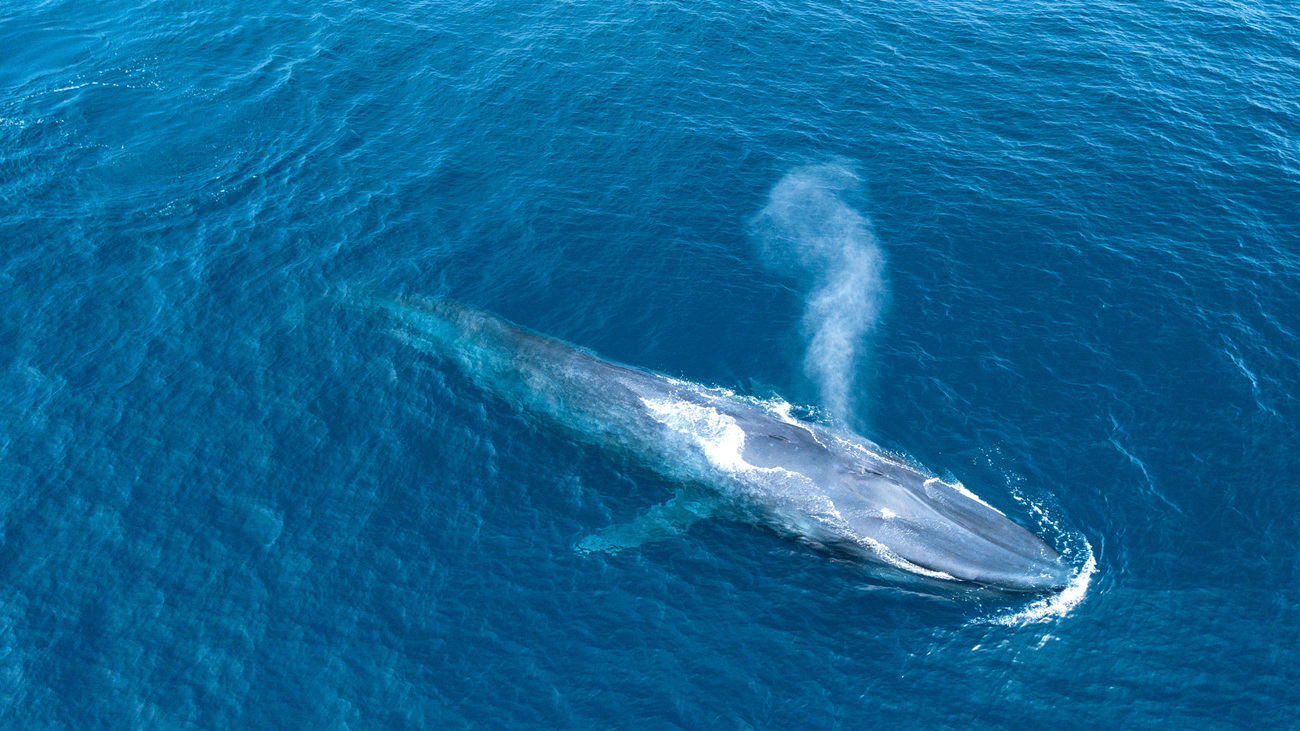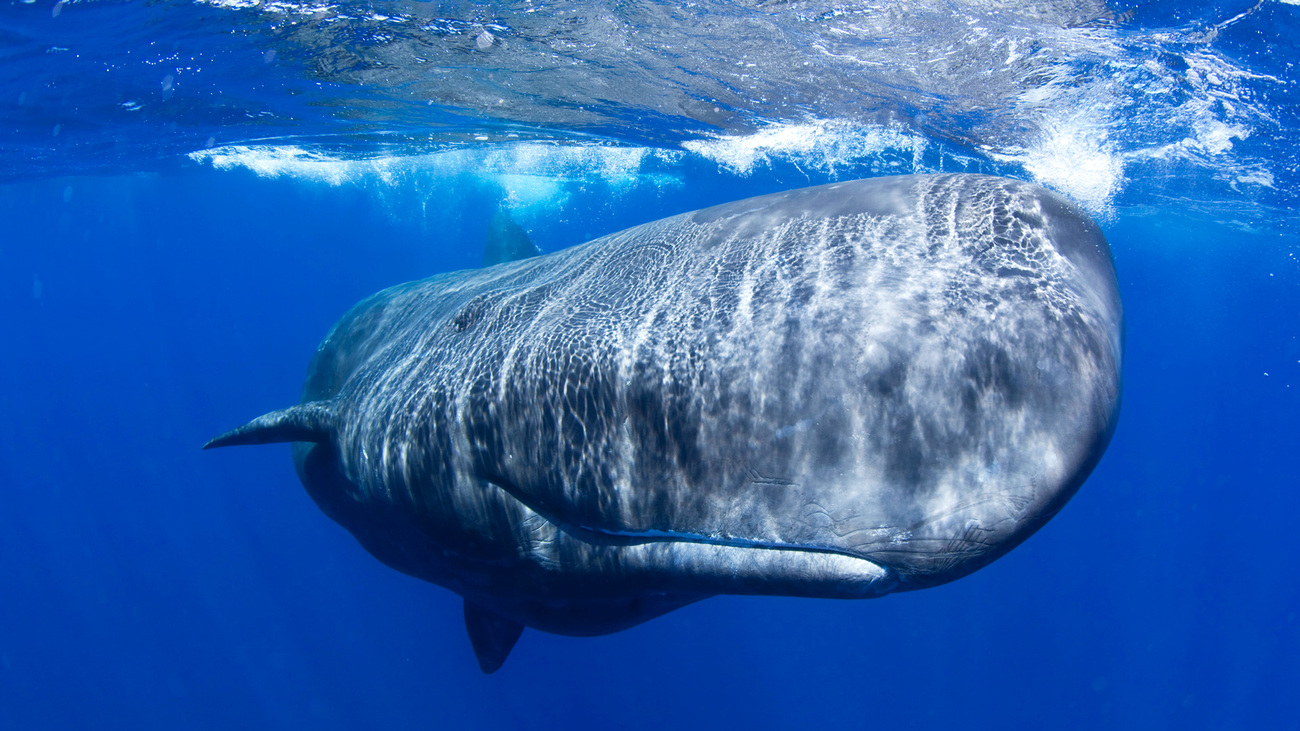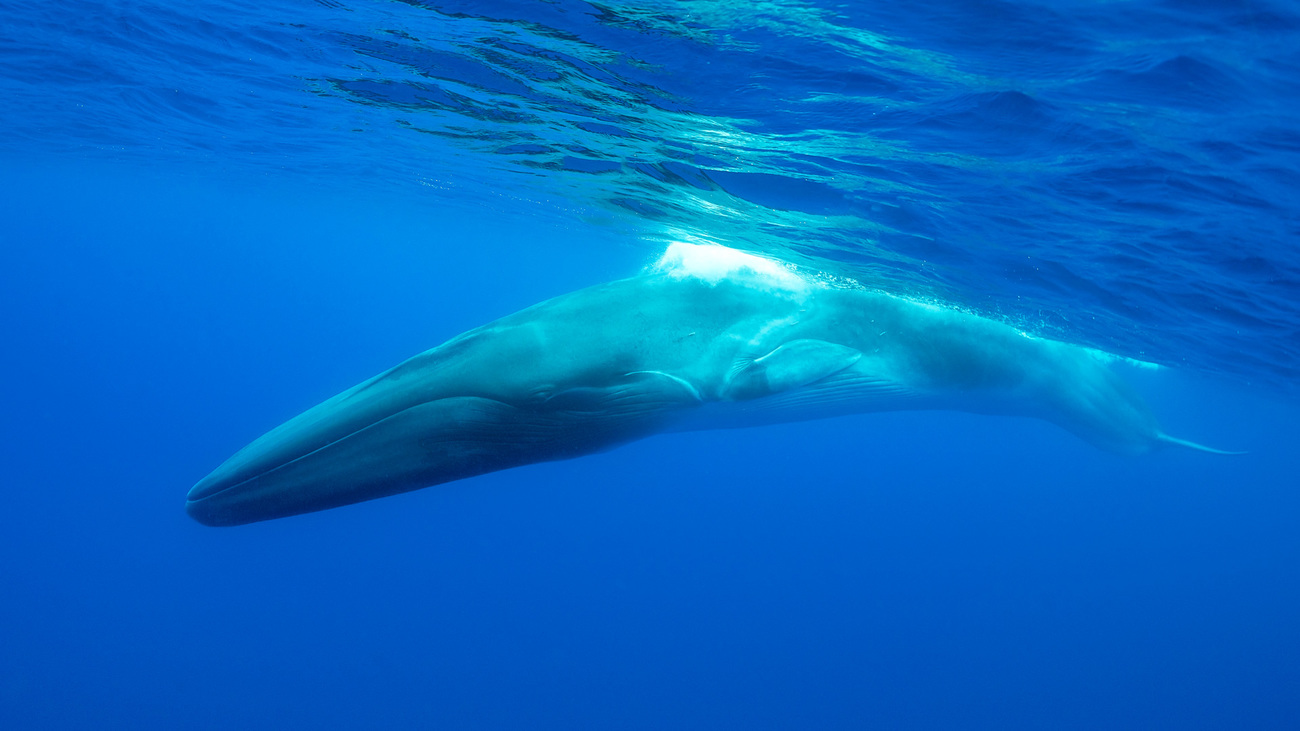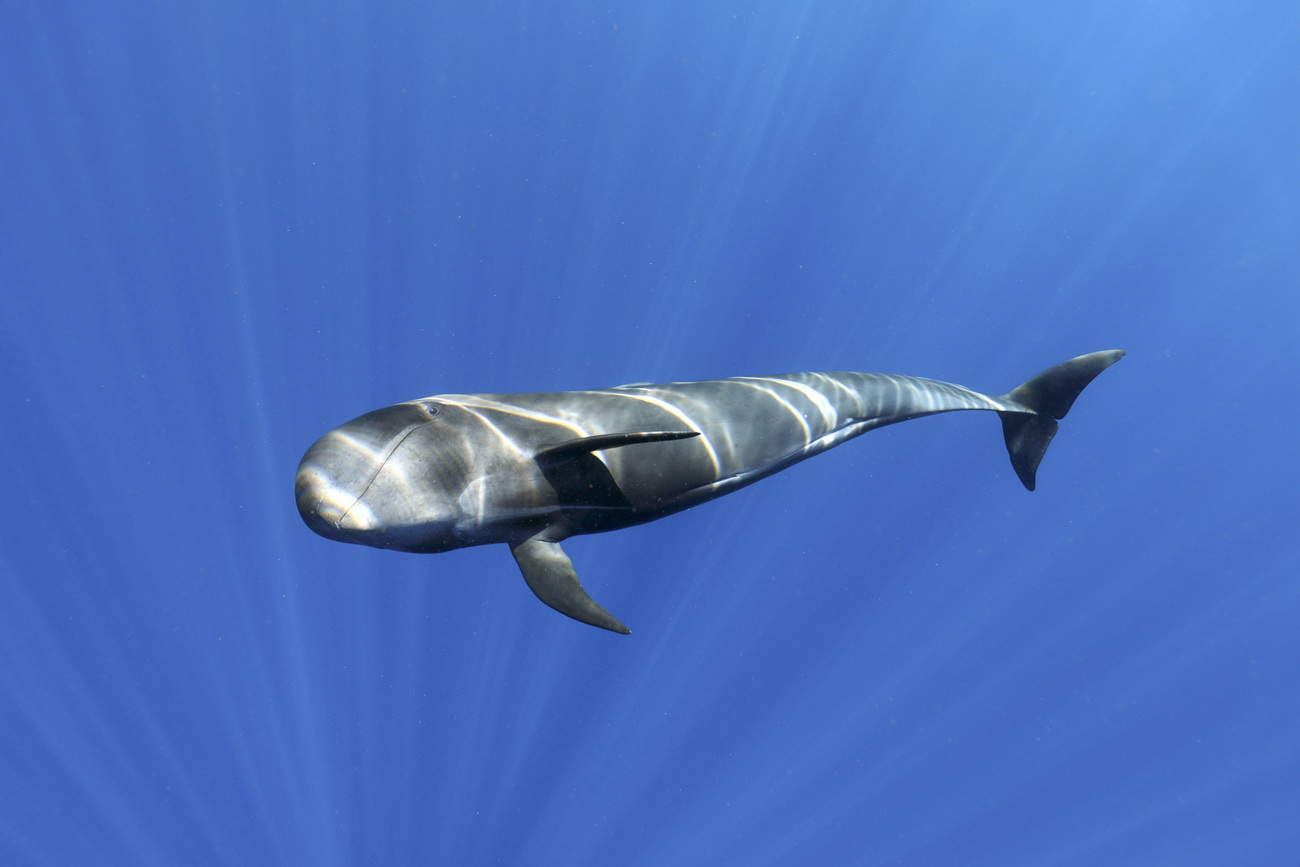Saving the North Atlantic right whale - North America
Don't fail our whale
See projectWhales are some of the largest animals on earth. Like humans, these marine mammals are warm-blooded, breathe air, and nurse their young. There are 90 different whale species, split into two main categories: baleen whales and toothed whales.
Baleen whales have mouths filled with baleen (fringed plates made of keratin) which filter out small fish and tiny zooplankton from the seawater so the whales can eat. Blue, bowhead, and gray whales are all examples of baleen whales. Other whales have teeth. These species—which include belugas and orcas—actively hunt fish, squid, and other sea creatures.
Whales sit at the top of the marine food chain and play an important role in maintaining healthy ocean habitats. When whales dive into the depths of the ocean, they help stir up and circulate nutrients. This supports the production of phytoplankton (a key food source for many fish and crustaceans) at the water’s surface. Whales’ nutrient-rich faeces are also beneficial to the environment, as they help ocean plants and phytoplankton to grow, contributing to the absorption of carbon dioxide and production of 50% of the world’s oxygen.
Whales are incredibly important to our ecosystems. To discover more about these ocean giants, let’s dive right into some amazing facts about whales.
Cetacea is the scientific name for whales, dolphins, and porpoises.
There are over 90 species of whale. Among them are the North Atlantic right whale (Eubalaena glacialis), the humpback whale (Megaptera novaeangliae), the blue whale (Balaenoptera musculus), and the beluga whale (Delphinapterus leucas).
Whale conservation status varies from species to species. According to the IUCN Red List of Threatened Species, a number of whale species fall into the ‘least concern’ category. These include bowhead and humpback whales, whose populations are increasing.
However, there are a number of whale species classed by the IUCN as ‘near threatened’ or ‘vulnerable.’ The blue whale is classed as ‘endangered,’ and Rice’s whale and the North Atlantic right whale are classed as ‘critically endangered.’ This means these species face a very high risk of extinction in the wild.
There are a number of reasons why some whale species are struggling to survive. Commercial whaling, ship strikes, entanglement in nets, and climate change all pose a threat to whale populations.
Whales live in every ocean on the planet. They can be found in temperate oceans and tropical waters around the equator, as well as in the freezing Arctic and Antarctic oceans.
Some whale species can be found in seas, including the North Sea and the Mediterranean. Others migrate from one area to another to get to their feeding or mating grounds.
Commercial whaling, ship strikes, entanglement in nets, and climate change all pose threats to the future of whale species.

There’s a global ban on commercial whaling and on the international trade of whale products. Despite this and established global agreements, Iceland, Japan, and Norway continue to hunt whales commercially. Over 1,000 whales per year are killed through commercial whaling.
Our oceans include busy trade and transport routes, which means lots of ships travel through whale feeding and breeding grounds. This can lead to whales being struck by ships, which can injure or kill them.
Ships and offshore drilling also create a lot of noise, which can disrupt whale communication and even damage whales’ hearing. This can prevent whales from visiting the feeding and breeding grounds that are key to their survival.
Around 12 million tons of plastic end up in the world’s oceans each year, 10% of which consists of fishing gear, including nets, lines, and ropes. This ocean debris is harmful to many marine species, whales included.
Whales can become entangled in discarded fishing nets and ropes, which cause injury, malnutrition, infection, and death. Scientists estimate that hundreds of thousands of whales die every year due to entanglement.
Because of climate change, the oceans are warming, currents are changing, and sea ice is melting in the polar regions. All of these changes affect the availability and location of whale food, which in turn reduces their energy levels and reproductive rates.

Whales are fascinating creatures. If you want to find out more about these magnificent marine mammals, take a look at these incredible facts about whales.
Whales are mammals, not fish. They’re warm-blooded, they breathe air through their lungs, and they give birth to live young.
A whale’s favourite food varies depending on its species. Sperm whales feed on squid, humpback whales like krill and small fish, and beluga whales eat octopus, squid, crabs, clams, shrimp, snails, and sandworms.
Whales sleep by shutting down half of their brain. The other half stays awake so they remember to come to the surface and breathe. After some time, they switch sides, so the whole brain gets to take a rest.
Life expectancy varies among whale species. The minke whale has an average lifespan of 30 to 50 years, while the bowhead whale lives much longer, reaching 100 to 200 years old.

Breaching is when whales leap out of the water and splash back down into it. There are various theories as to why they do this. Whales may breach to show off their prowess and playfulness during mating season,to warn nearby whales of a possible threat, or to direct other whales to a source of food.
The Antarctic blue whale is the biggest whale—and the biggest animal—on the planet. This species of whale can weigh over 180,000 kilograms and reach nearly 30 meters in length.
Many whale populations came close to extinction in the 19th century, back when whaling took place on an industrial level. It’s thought that two thirds of the sperm whale population and up to 90% of the blue whale population were lost during this time.
Some whale species, including the North Atlantic right whale, are still struggling to recover from this period of intense hunting. Today, scientists estimate that less than 340 remain—and fewer than 70 are reproductive females capable of bringing new calves into the world.

IFAW works to protect whales, marine life, and habitats around the world.
In the United States and Canada, our team is racing against the clock to save the North Atlantic right whale from extinction. Entanglement and vessel strikes have pushed this species to the brink, so we’re working with fishermen, gear manufacturers, and regulators to support innovative solutions, including ‘on-demand’ fishing gear that helps prevent entanglements.
We’re also working to prevent vessel strikes, which are a leading threat to the survival of North Atlantic right whales in the US and Canada, blue whales in Sri Lanka, sperm whales in Greece, and Bryde’s whales in New Zealand, to reduce whale injuries and deaths. In some cases, this means moving shipping lanes away from critical whale habitat or imposing slower ship speeds.
Ocean noise pollution is another big problem for whales. So, alongside the Natural Resources Defense Council (NRDC) and creative agency Imaginary Forces, we produced an Emmy award-winning documentary, Sonic Sea to help raise awareness of this invisible pollutant. It explores the dangers of ocean noise pollution and the solutions IFAW is working on to reduce it.
Over in Europe, our Blue Speeds campaign aims to decrease ship speeds to make our ocean safer, quieter and healthier for whales and other marine life. By setting a speed ‘ceiling’ for commercial ships utilising ports in the European Union, we can help reduce underwater noise pollution, the risk of collisions with whales and also decrease harmful greenhouse gas emissions from shipping. And it’s a win-win for the industry, too—Blue Speeds could save the maritime sector billions of euros in fuel costs in addition to these ecological benefits.
IFAW has been hard at work over in Iceland too. Here, most of the demand for whale meat came from overseas visitors because it’s advertised to tourists as a traditional Icelandic food. Through our ‘Meet Us, Don’t Eat Us’ campaign, we’re helping to promote whale watching as a sustainable alternative to commercial whaling, and debunking the myths about whale meat. Finally, thanks to decades of work, commercial whaling in Iceland may soon be over, putting an end to the needless killing of whales in this beautiful country.
With support from our local teams and partners, IFAW has been able to save the lives of whales across the globe. Yet there is still so much more we have to do.
By making a 100% tax-deductible donation, you can support our whale conservation programs and projects around the world.
Saving the North Atlantic right whale - North America
Don't fail our whale
See projectEntangled Whale Rescue - Global
Veterinary medicine and drone technology can help free whales trapped in fishing gear
See project21st Century Shipping
Avoiding a collision course to save whales
See projectOcean Noise Reduction - Global
Saving marine life could be as easy as turning down the volume
See projectWhale Watching Promotion - Global
Watching is better than whaling
See projectCommercial Whaling Opposition - Global
We’re shifting the global mindset and protecting whales for the future
See projectOur work can’t get done without you. Please give what you can to help animals thrive.
Unfortunately, the browser you use is outdated and does not allow you to display the site correctly. Please install any of the modern browsers, for example:
Google Chrome Firefox Safari